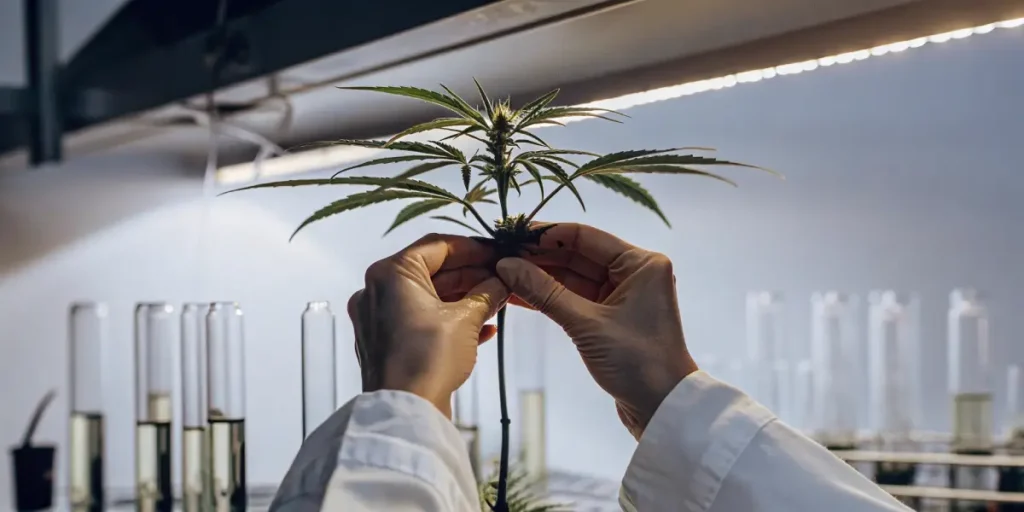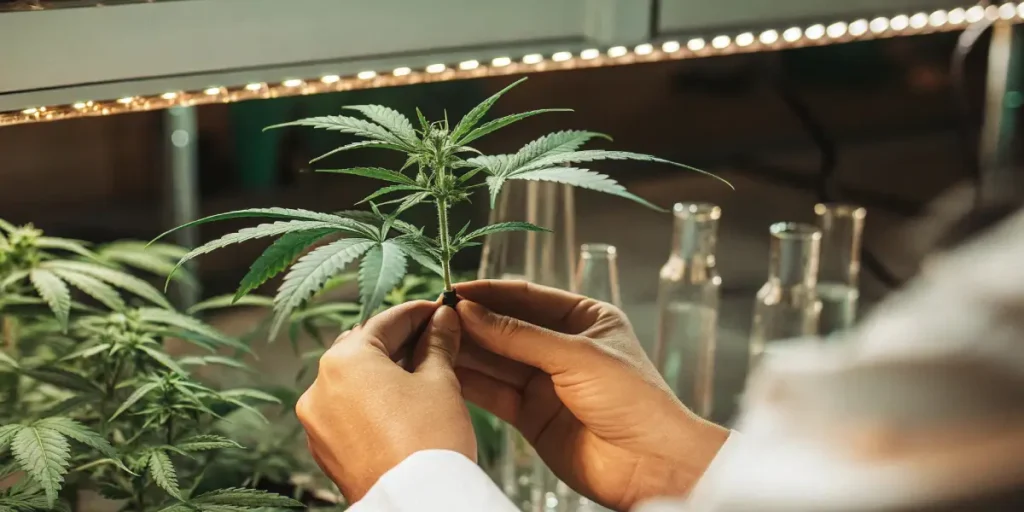
How to Enhance Cannabinoid Yield with Enzymes
You’re on a quest to boost your cannabis yields, right? Well, enzymes might just be the secret weapon in your arsenal. If you’re wondering how to enhance cannabinoid yield with enzymes, the answer lies in their ability to break down complex substances into simpler, absorbable forms. This process helps cannabis plants thrive, improving nutrient uptake and ultimately leading to increased cannabinoid production.
Think of enzymes as tiny workers that speed up chemical reactions in plants. They transform nutrients into forms that are easier for plants to absorb. By using these natural catalysts, you can significantly enhance cannabinoid yield and improve the potency of your cannabis crop.
Recommended Strains
Biscotti
|
|
THC | 25% - 30% (High) |
|
|
Type | Feminized |
|
|
Yield | Medium |
|
|
Phenotype | 80% Indica / 20% Sativa |
Biscotti Mintz
|
|
THC | 22% - 25% (Medium) |
|
|
Type | Feminized |
|
|
Yield | High |
|
|
Phenotype | 80% Indica / 20% Sativa |
For those interested in trying out enzyme-enhanced growing, check out Blimburn Seeds selection. Strains like OG Kush, Sour Diesel, and Blue Dream are perfect candidates for this method, thanks to their robust growth and high cannabinoid potential.
How to Use Enzymes to Boost Cannabinoid Production
Start by choosing the right enzymes for your cannabis plants. You want enzymes that break down organic matter into nutrients your plants can easily absorb. Popular choices include cellulase, which breaks down cellulose, and protease, which helps with protein breakdown.
Enzymes are typically added to the watering routine. Simply mix them with water and apply them to the soil or hydroponic system. This method ensures the enzymes can interact with the root system and start working their magic. Regular applications can lead to a noticeable increase in cannabinoid yield.
Knowing how to use enzymes to boost cannabinoid production requires careful observation and adjustment. Different strains may require varying types and concentrations of enzymes, so it’s essential to monitor plant responses. This approach allows growers to tweak their methods for optimal results.
Moreover, knowledge about how to enhance cannabinoid yield with enzymes is constantly evolving. Staying informed about the latest enzyme technologies and methodologies can give you a competitive edge in the cultivation process, ensuring your crops reach their maximum potential.
Increasing Cannabinoid Yield with Enzyme Applications
Regular enzyme applications can lead to larger, more potent buds. Enzymes help the plant absorb nutrients more efficiently, leading to healthier growth and increased cannabinoid production. The key is consistency. Make enzyme applications a regular part of your care routine for the best results.
For example, cultivators of Blimburn Seeds Sour Diesel have reported seeing a significant boost in yield after incorporating enzymes into their feeding schedule. The improved nutrient absorption can result in plants that are more resistant to stress and disease.
By increasing cannabinoid yield with enzyme applications, growers can also see improvements in the overall health and vigor of their plants. Enzymes work by breaking down organic compounds into simpler molecules, making it easier for plants to absorb them. This not only boosts cannabinoid production but also strengthens the plant’s natural defenses.
Enzymes for maximizing cannabinoid extraction efficiency play a crucial role in modern cannabis cultivation. By utilizing the right enzymes, growers can ensure that their plants are capable of producing the highest quality cannabinoids, leading to a superior end product.
Promos & Deals
Optimizing Cannabinoid Yield Through Enzymatic Processes
Enzymatic processes can be a game-changer for cannabis cultivators. By optimizing these processes, you can ensure your plants are getting the most out of the nutrients available to them. This involves choosing the right balance of enzymes and monitoring their effects on plant growth.
Tracking plant health and growth patterns can help you tweak your enzyme applications. Look for signs of improved vigor and enhanced cannabinoid production. Adjust the enzyme types and concentrations based on your observations to perfect your growing strategy.
Optimizing cannabinoid yield through enzymatic processes is not just about applying enzymes; it involves an integrated approach to cultivation. From soil quality to watering schedules, every aspect must be considered to maximize the benefits of enzyme applications.
Furthermore, advanced growers are exploring how to enhance cannabinoid yield with enzymes by combining them with other natural treatments. This synergistic approach can lead to unprecedented levels of cannabinoid production, setting new standards in the industry.

Enhancing Cannabis Potency Using Enzyme Technology
Enzyme technology is revolutionizing how growers approach cannabis cultivation. With the right enzymes, you can push your plants to achieve their full genetic potential. This means more cannabinoids and a higher-quality product.
Blimburn Seeds Blue Dream is an example of a strain that responds well to enzyme technology. Growers have reported a noticeable increase in potency when enzymes are integrated into the growing process. The result is a more robust plant with a higher THC content.
Enhancing cannabis potency using enzyme technology allows growers to target specific goals, such as increasing THC or CBD levels. By selecting the appropriate enzymes, cultivators can fine-tune their crops to meet market demands and consumer preferences.
This technology also supports sustainable farming practices. By reducing the need for chemical fertilizers, enzyme technology not only boosts cannabinoid yield but also promotes environmentally friendly cultivation methods. This ensures a healthier product for consumers and a more sustainable future for growers.
FAQs About how to enhance cannabinoid yield with enzymes
What are the best enzymes for cannabis growing?
When selecting enzymes for cannabis, look for those that aid in nutrient absorption. Common options include cellulase, protease, and amylase. These enzymes help break down organic materials into essential nutrients. This ensures your plants receive the necessary components for growth.
Each enzyme serves a different function. For example, cellulase helps break down cellulose into sugars, while protease breaks proteins into amino acids. Choosing the right combination can boost overall plant health and cannabinoid yield.
Choosing the best enzymes for cannabis growing involves knowing how each enzyme interacts with your specific strain. Some strains may benefit more from one enzyme than another, so careful experimentation and documentation can lead to better results.
Besides to the commonly used enzymes, researchers are continually discovering new ones that can further enhance cannabinoid yield. Keeping abreast of these developments can help you incorporate the latest advancements into your growing strategy.
How often should I apply enzymes to my cannabis plants?
Frequency of enzyme application can vary. However, a general guideline is to apply them every two to four weeks. This regular schedule allows enzymes to consistently support nutrient absorption. It also helps maintain optimal soil health.
Monitor your plants for any signs of nutrient deficiency or excess. Adjust the frequency of enzyme applications based on plant response. Consistent monitoring helps ensure you’re enhancing cannabinoid yield efficiently.
Knowing how often to apply enzymes also means considering environmental factors such as humidity and soil composition. These can influence how enzymes are absorbed and utilized by the plant, impacting the overall effectiveness of your applications.
Additionally, documenting the effects of each application can help you refine your approach over time. By keeping track of how different strains respond to varying enzyme schedules, you can develop a tailored strategy that maximizes cannabinoid yield across your entire crop.
Can enzymes replace traditional fertilizers?
Enzymes are not a replacement for traditional fertilizers. Instead, they complement them. While enzymes help break down organic matter into nutrients, fertilizers provide essential elements like nitrogen, phosphorus, and potassium.
For best results, integrate enzyme applications into a comprehensive nutrient management plan. This combination supports healthy plant growth and maximizes cannabinoid production efficiency.
While enzymes enhance nutrient availability, traditional fertilizers supply the necessary macro and micronutrients that plants need for robust growth. Knowing how to balance the two is key to optimizing cannabinoid yield through enzymatic processes.
Some growers are exploring how to enhance cannabinoid yield with enzymes by experimenting with organic fertilizers in combination with enzyme applications. This approach can lead to healthier plants and more sustainable cultivation practices.
Are enzymes safe for all cannabis strains?
Most cannabis strains respond well to enzyme applications. However, it’s always a good idea to start with a small test batch. This allows you to observe how a specific strain reacts before applying enzymes to your entire crop.
Certain strains, like Blimburn Seeds’ OG’s Kush, are known for their resilience and high cannabinoid potential. They often show positive results when enzymes are used as part of their growing process.
When considering enzymes for maximizing cannabinoid extraction efficiency, it’s essential to recognize that some strains may require different enzyme formulations. This can be due to genetic differences in how they process and utilize nutrients.
Experimentation and careful observation are crucial in determining the best enzyme strategy for your specific strains. This ensures that you’re not only enhancing cannabinoid yield but also maintaining the overall health and vitality of your plants.
Can I use enzymes in hydroponic systems?
Yes, enzymes can be highly effective in hydroponic systems. They help maintain clean and efficient nutrient solutions. Enzymes break down dead organic material, reducing the risk of blockages and promoting healthier root systems.
When using enzymes in hydroponics, ensure they are compatible with your nutrient solution. Regular monitoring and adjustments will help you optimize cannabinoid yield through enzymatic processes in a hydroponic setup.
Using enzymes in hydroponic systems also aids in maintaining a balanced pH level, which is crucial for nutrient uptake. This balance is essential for maximizing cannabinoid yield and ensuring plant health.
For hydroponic growers, knowing how to enhance cannabinoid yield with enzymes involves not only selecting the right enzymes but also integrating them seamlessly into the nutrient regimen. This ensures that the benefits of enzyme technology are fully realized in a soilless environment.




















